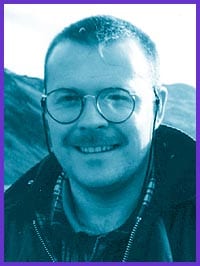Last night was one of the hardest ones of all. It’s been just over a week since Vancouver Starbucks manager Anthony McNaughton died at the scene of his stabbing on Jan 29, yet amidst the storm of media inquiries and the comparatively mundane details of organizing Friday’s funeral, the tragedy took time to simmer.
Three of McNaughton’s chosen family, his tight circle of friends, are meeting me to speak of him: Norbert Beilstein, Bruce Anderson and his partner Clive Raher.
The whole gang, with McNaughton’s lover of 12 years, Allen, had dinner together last night and came to the realization that McNaughton wasn’t coming home.
The chosen family has been “formidable,” as one observer has put it, in managing the furor arising from their friend’s murder. It was Anderson and Raher who stayed with Allen that first night without their Tony.
Anderson and Raher picked up McNaughton’s parents and siblings at the airport, when they flew in from Belfast for the funeral.
The network of friends only grew tighter in this tragedy. As soon as Allen was visited by a Vancouver police officer that morning (McNaughton was murdered around 7am), upstairs friends and neighbours too found out what happened.
They phoned Beilstein, who phoned Raher, who phoned Anderson. Raher was last to arrive, at 11:30am that morning. He says so almost apologetically, as he was slowed down by traffic coming in from out of town.
Despite the high profile in the case few know much about Allen, not even his last name. Raher says that’s intentional. Soon he and Anderson will take their friend away from the city, to heal.
In life, McNaughton and Allen never kept quiet about the nature of their relationship. Yet the fact McNaughton was gay seemed to escape the attention of reporters.
“The media hasn’t picked up on it. It’s no secret to everybody involved: Allen is Tony’s family,” says Raher. “And why they haven’t picked it up I don’t know.”
Police have called McNaughton a hero, for stepping in the way of a knife wielded by an assailant after a female Starbucks employee. Charged with second-degree murder is the woman’s estranged husband Mirhashem Seyed-Fatemi, 49.
Anderson is wary and weary of the hero talk. But he’s also realistic: there are some who would choose to paint his friend a hero, even a gay hero, one who shattered our passive stereotypes and laid down his life for another.
“I think the concern first of all is Tony was a private man. He did what he did every day, genuinely, because that was who he was. We’re also not naive enough to believe that there aren’t people who will find this, and try to turn it into their own cause,” says Anderson.
“Tony wasn’t at the time standing there, I’m sure, saying I’m a gay man, so I’m going to set a model for gay men. He didn’t say this is an act against a woman, so I’m going to step into it. Tony said this was an act of aggression and an act of violence, and it’s against a person.”

 Why you can trust Xtra
Why you can trust Xtra


